6 Section 1-6: The Verb “sein”
1–6: The Verb “sein”
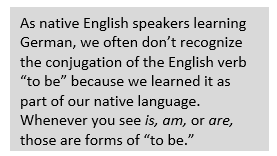 So far, you have been using the German verb “sein” to describe people and things.
So far, you have been using the German verb “sein” to describe people and things.
sein = to be
Sein is one of the two most important verbs in the German language. You will use it in future chapters to make compound verb tenses. For now, you will learn it in the present tense.
In German, sein is an irregular verb, which means you must memorize its conjugation.
sein—to be
|
ich bin—I am |
wir sind—we are |
|
du bist—you are (informal) |
ihr seid—you (plural) are; y’all are |
|
er/sie/es ist—he/she/it is |
sie/Sie sind—they are; you (polite) are |
You can listen to this song to learn the conjugation of sein.
Beispiele: The verb form of „sein“ is highlighted below. Notice that the subject, i.e. the person or thing doing the action, is the word that determines which form of “sein” you will use. The subject is in italics, and the verb is bold-faced.
- Ich bin nicht pünktlich. (I am not punctual.)
- Du bist sehr freundlich. (You are very friendly.)
- Er ist Professor. (He is a professor.)
- Sie ist Lehrerin. (She is a teacher.)
- Es ist kalt. (It is cold.)
- Wir sind nicht sehr groß. (We are not very tall.)
- Ihr seid progressiv. (You guys/y’all are progressive.)
- Sie sind athletisch. (They are athletic.)
Watch this clip from The Empire Strikes Back (in German) to hear Darth Vader’s famous line in German, which uses the verb sein:
Video. Conjugation of the verb “sein.” Watch the video to see me reteaching this.
Video. Easy German: Sein. For more examples with the verb „sein,“ watch the video below. It includes more than we will learn in chapter 1. The first 1:40 of the video covers what we have done in class so far. If you’re feeling brave, you can watch the whole video!
Listen to Frida Gold’s song, 6 Billlionen (2013), to hear lots of examples of the verb sein conjugated.
Das Wetter
You can also use the verb sein to describe the weather.
A: Wie ist das Wetter im Winter in Berlin?
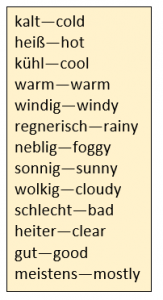 B: Es ist meistens kalt.
B: Es ist meistens kalt.

Ex. C: Wie ist das Wetter? Using the cues provided, describe the weather using complete sentences.
Beispiel: 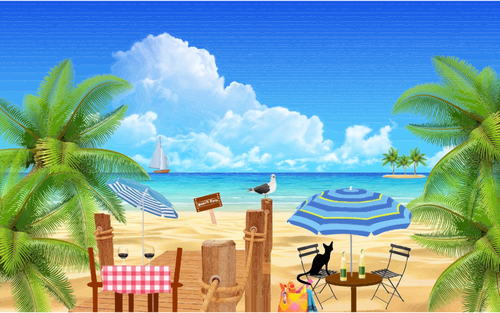
→Es ist heiß und wolkig.
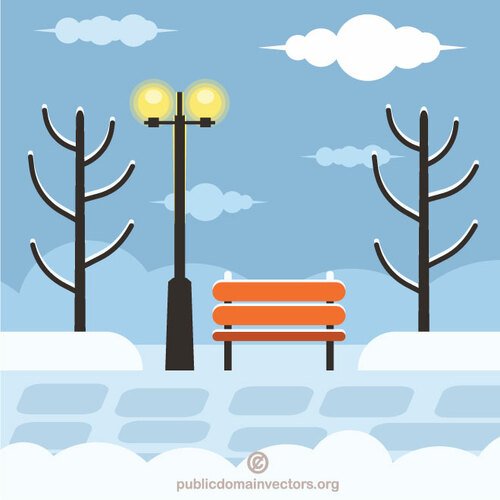 6.
6. 
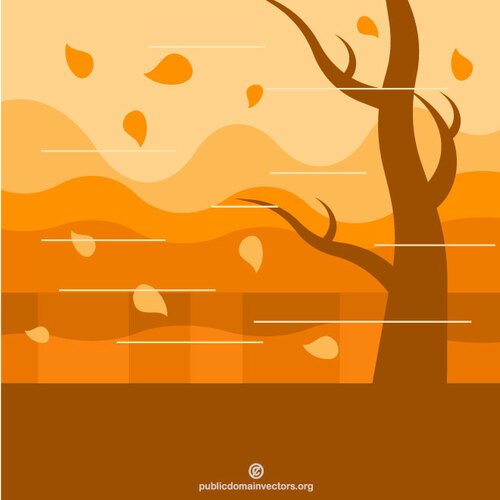 7.
7. 
 8.
8. 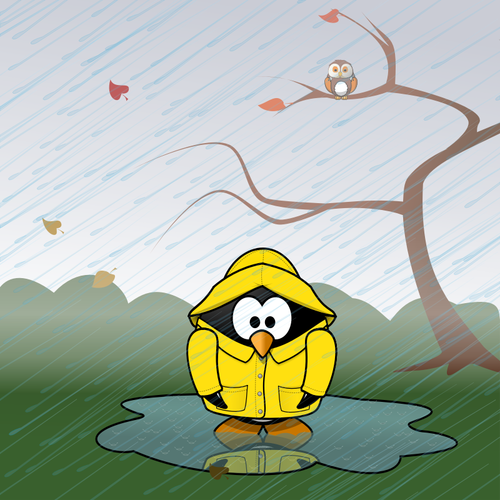
 9.
9. 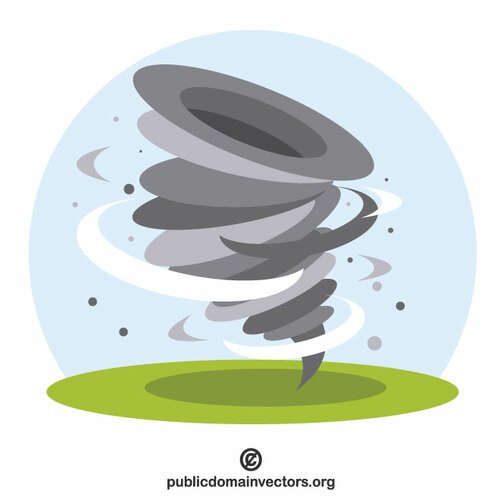
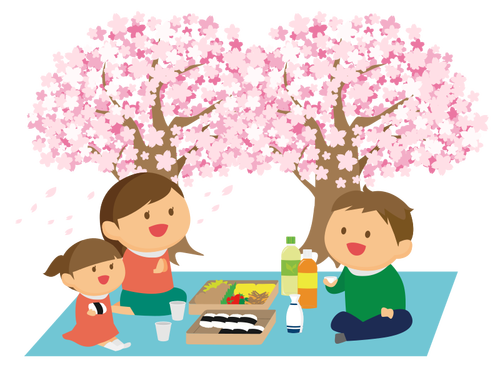 10.
10. 
Ex. D: Video. Easy German. The Weather
Watch the video and answer the following questions about the weather around the world. Some questions have more than one correct answer.
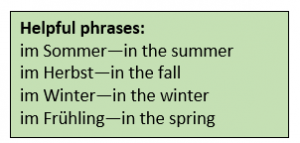
EXTRA PRACTICE: Click Germanzone.org’s online links to get more practice with weather.
Ex. F: Bist du gut in Mathe? Now ask your classmates how well they do in the following subject areas.
A: Bist du gut in Mathe? (Are you good in/at math?)
B: Ja, ich bin gut in Mathe. (Yes, I am good in/at math.)
B: Bist du gut in Physik?
A: Nein, ich bin nicht so gut in Physik.
- Mathe
- Physik
- Chemie
- Biologie
- Musik
- Sport
- Literatur
- Spanisch
- Deutsch
- Italienisch
- Englisch
- Psychologie
- Geschichte
Watch this clip from Avengers Endame (in German) to hear another example of the verb sein:
EXTRA PRACTICE: Need more practice with sein? Click the links below for some online practice that will check your answers automatically. There may be some words in the sentences that you don’t understand, but don’t worry about those for now. All you need to do is to look for the subject of the sentence and conjugate the verb for that.
- https://german.net/exercises/verbs/sein/
- https://www.germanzone.org/verb-sein-present-tense-1/.
- https://www.germanzone.org/verb-sein-present-tense-2/.
Ex. G: Wiederholung!
So far, you have learned how to introduce yourself, say where you live, and describe yourself as well as others. In the space below, write a brief description of yourself and two of your friends. If you can’t think of what to write, here are a few suggestions: name, where you come from, where you live, how the weather is in your area, your age, a few adjectives to describe yourself, etc.
- (yourself)
2. (friend 1)
3. (friend 2)
Now go back and reread what you wrote. Did you remember to put “aus” after “kommen?” (i.e. come from?) Did you remember to put “in” after “wohnen”? (i.e. live in?)
And finally, Ich bin Groot:

